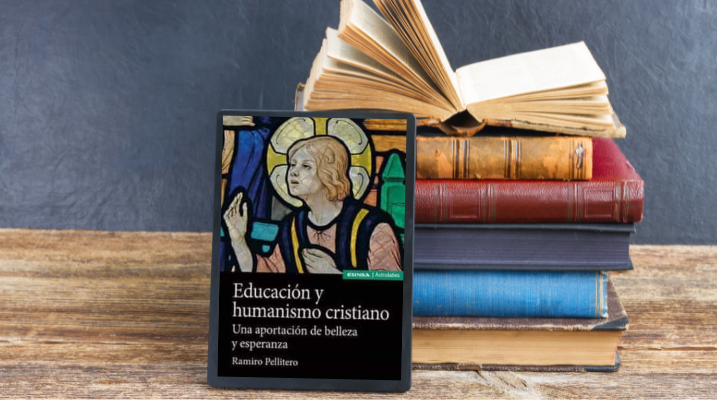
The Catechism of the Catholic Church explains that Christian morality responds to the man's vocationlife in the spirit. This highlights both the joy and the demands that this path brings to life and to our moral education.
The education Education for Christian morality is part of "catechesis" in its original sense as formation for Christian life at all ages and not only for children. Christian morality has certain characteristics that are deduced not only from ethics or rational morality, but also specifically from the proclamation of Christ (kerygma) and the Kingdom of God through the mission of the Church (1).
The characteristics of Christian moral education, as set forth in the Catechism of the Catholic Church (nn. 1691-1698), can be summarized in the following points:
1. The education of faith for life in Christ. This life is a participation in the very life of God, thanks to the Holy Spirit, who is the "Spirit of Christ. The work of Christ heals us and restores us to the image and likeness of God lost through sin.
From baptism, which makes us abandon the "old man" and be reborn in Christ, we have the seed of a full human life-what we call the life of grace-which has its own rules and norms. This is why the baptismal font sometimes takes the form of a maternal womb: baptism causes us to be reborn with Christ in the womb of the Church.
2. Christian moral education, therefore, emphasizes the role of the Holy SpiritHe is the consoler and host of the soul, the light and source of his gifts that elevate human nature to the order of grace. He is truly a new life in Christ through the Holy Spirita life that is a participation in the divine life, a "deiform life".
For this purpose, the Holy Spirit gives his gifts (wisdom and understanding, counsel and fortitude, knowledge, piety and fear of God) which embrace our whole being, elevating nature to the order of grace. These gifts produce the "fruits of the Spirit" ("charity, joy, peace, patience, longsuffering, kindness, goodness, gentleness, meekness, faithfulness, modesty, continence, chastity" (Gal 5:22-23, Vulgate edition, Catechism of the Catholic Church, 1832) and the works that correspond to the beatitudes (see below).
3. As we have seen, Christian moral education is education for the life of graceand not only for ethical behavior on a rational level. The horizon of the Christian life is that of configuration to Christ, that is, interiorly "becoming the form" of Christ. In other words, the fullness of the moral life is holiness, in union with God's will.
For this, the Christian "loses his own life" for Jesus, supporting the redemptive work of the Trinity that is given to us in its entirety. All this happens starting from baptism, which inserts us into the dynamic of the Holy Spirit: a dynamic of love, which leads us to ardently desire the good, and not just any good, but the good in the perspective of the life of Christ. The life of grace develops from baptism, with the sacraments, prayer and all the work of the Christian.
4. Christian moral education is also a education on the Beatitudes. The just (or the saint) is happy with the happiness that comes from adhering to God. The true disciple is the one who freely chooses this path of the beatitudes, which are the "face of Christ".
They are the guarantee of a "paradoxical" happiness, for they not only offer happiness to man, but also guarantee it for the poor in spirit, the meek and the afflicted, the hungry for justice and the merciful, the peacemakers and those persecuted for Christ's sake (cf. Mt 5:3-11).
5. Christian moral education is an education on sin. Education on sin and forgivenessand about forgiveness. The sin is perdition because it involves, from the heart of man, an offense to God and to one's neighbor, by damaging the order of love. With sin come the "works of the flesh" (cf. Gal 5:19-21), which are opposed to the fruits of the Spirit.
Therefore, sin -and we are all sinners- needs the conversion: to benefit from the mercy of God to attain salvation, which comes with the forgiveness of sins and the definitive victory over the consequences of sin, which are pain and eternal death.
No one saves himself, by his own knowledge or efforts, nor can man save himself in conjunction with other men without counting on God. Welcoming God's mercy makes us merciful to others.
6. Christian moral education is a education of the virtues and, with them, of discernment. An education of virtues goes beyond an education of values, but virtues, values and norms must be present in all ethical education.
Among the human or moral virtues, the following stand out prudence, virtue that bridges the cardinal virtues (prudence, justice, fortitude and temperance) and the theological virtues (faith, hope and charity).
Prudence is the foundation of conscience moral (cf. Catechism of the Catholic Church, 1776 y 1794). Prudence allows the discernment necessary to know how to make the right choices in life. It makes one know and practice what is good. The prudent person is not satisfied with the end of his actions being right: he wants the means and the way of acting to be right as well.
For this reason he also chooses concretely the time and the place in which it is convenient to act, avoiding taking useless or false steps. The prudent person possesses the balanceunmistakable characteristic of spiritual maturity (2).
The theological virtues enable the Christian to participate, in his own actions, in the Trinitarian life received as a gift.
Thus it is possible for him to follow Christ by participating in his own vital experience ("seeing" spiritually with his eyes, "feeling" with his heart, "acting" with his attitudes). In this way the Christian can orient every decision and every action in the light of the Triune God. In the same way, the theological virtues inform and enliven the moral virtues and the whole of Christian action (3).
7. At the center of education for the "new life" of the Christian is "the twofold commandment of charity," developed in the Decalogue of the Commandments. For Jesus, love of God and love of neighbor are inseparable (cf. Mk 12:29-31) and are united in "the new commandment".
From that point on, love is no longer just a commandment, but a response to God's love who comes to meet us. "Love can be commanded because it is first given" (4); moreover, for the Christian, this response is integrated into Jesus' life of self-giving, the fruit of his love (cf. Jn 17-26).
This means that Christian moral life is a participation in the same love of Jesus. This is charityfruit of the Holy Spirit who makes possible what seems humanly impossible: to love as Jesus himself has loved (5).
8. Christian moral education is an education for the Eucharistic life and its fruit, which is an ecclesial life. In the Eucharist Jesus makes us his own and becomes our nourishment for the journey of life until his second coming and to carry out the very mission he received from the Father.
Only with the Eucharist, the center of all the sacraments, we are capable to carry forward what has been said so far: to live in Christ through the Holy Spirit, to progress in the life of grace and in the way of the beatitudes and virtues, to reject sin and always discern the good in our actions, living in charity with God and others.
Since the Eucharist is received from the Church y results in our growth in the life of the Church.the moral life of the Christian does not develop in an individual way, but rather as a in the "communion of saints" which is the Church.
By participating in the life of Christ in the Church (his mystical Body), we also participate, each according to his or her specific vocation, gifts and charisms, in the mission of the Church. The Church is essentially missionary, evangelizing, proclaiming Christ and "sacrament of the unity of the human race".
To this end, the Church walks side by side with all people, especially the poorest and most needy. She is available for all their just demands or expectations. She is concerned for their good, thus extending beyond all limits the boundaries of her charity.

Every Christian is called, personally and in union with other Christians, to participate in this life that is given in union with Christ and through the action of the Holy Spirit. With all his work, even in the midst of ordinary life, the Christian is called to collaborate in building up the mystery of the Church - which is his mother, his body and his home, the holy people of God and the temple of the Holy Spirit - and in her evangelizing mission. As the Aparecida Document says, all Christians are missionary disciples.
9. In conclusion, in the perspective of the Catechism of the Catholic Church, Christian morals are "new life" in ChristThe "Way, truth and life" (Jn 14:6), the first and last center and point of reference for education in the faith.
For the Christian faith, full, true and eternal life is born and matures in relation to the "loving knowledge" of Christ (cf. Jn 17:3), which is the purpose of education in the faith.
The Christian vision of the person (Christian anthropology) makes it possible to understand and live the reality that each person carries within his or her being a call to self-realization according to the image of Christ. This means a tension to act according to truth and goodness (7) by "entering" freely into the life of Christ and participating in his self-giving.
From his encounter with Christ and his progressive identification with Him, every believer, moved by the constant action of the Holy Spirit, can, through his own life to announce the good news to the world of universal salvation, accomplished by the Lord (8).
For this reason, Christian morality implies "living and feeling with the Church and in the Church, which, in many situations, will also lead us to suffer in the Church and with the Church" (6). Christ at the center of Christian moral education
This ad has consequences for the structures and dynamics of the world created nature, which is to be renewed in Christ with the collaboration of the children of God (cf. Rom 8:19-22 and Eph 5:9).
Hence, a Christian has a special responsibility for the promotion of peace and justice, in the service of the common good, in the culture of life and in the care of the Earth (ecology). This is where the education of the social doctrine of the Church and more broadly of the social morality.
Therefore, everything that concerns the family and work, the economy and politics, the human community at all its levels and the environment becomes part of Christian morality not only for ethical reasons, but also as demands proper to the Christian's vocation and missionThe call to the transformation of society and the created world as an outline of the definitive Kingdom of God.
The Catechism of the Church, at the conclusion of its introduction on Christian moral education, takes up a text of St. John Eudes (17th century) who invites, prays and prays that let's think about Jesusso that we can think better of ourselves; so that we may know the desire of JesusWe can then say with the apostle: "For me to live is Christ" (Phil 1:21).
Bibliography:
Ramiro Pellitero IglesiasProfessor of Pastoral Theology at the Faculty of Theology of the University of Navarra.
Published in Church and new evangelization.